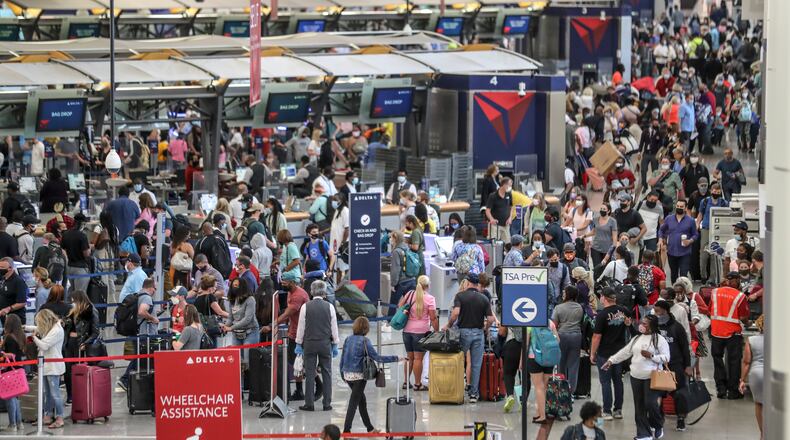Delta Air Lines CEO Ed Bastian said Thursday the company has “delayered” its staff — shrinking its workforce by 20% last year during the pandemic — and plans to keep costs low as travel recovers.
The Atlanta-based airline used buyouts and early retirements to cut about 18,000 people from its staff of 90,000 last year as the pandemic caused air travel to drop 60%.
Now, a spurt of vacationers venturing out on trips has revved up air travel, which is making a rapid recovery from the COVID-19 pandemic. Memorial Day weekend, the traditional start of the busy summer season, brought crowds of millions of leisure passengers into airports and planes. Delta’s domestic flights averaged more than 80% full over the holiday weekend and it expects domestic leisure travel to be more than 100% restored this month, though business and international travel is expected to take longer to recover.
As the airline predicts a return to 2019 traffic levels by 2023, “We don’t need to bring back as many of the people” — which will allow the company to keep its costs lower, Bastian told investors during a presentation at the Bernstein Strategic Decisions Conference.
The early retirements have “given a lot of younger people opportunities to step up. We have a younger team going forward and we’re getting the juniority benefits,” Bastian said.
That has cut labor costs. Delta also did not have to pay out profit sharing bonuses to all employees after posting a $12.4 billion loss for 2020. But it awarded them two free airline tickets after winning the top spot in a J.D. Power ranking of airlines last month, the first time since 1995 it has placed that high.
The company has also cut costs by replacing smaller, older planes with larger, newer, more fuel-efficient planes, and by restructuring how it handles staffing and uses contractors.
In Atlanta, for example, Delta is replacing in-flight caterer Gate Gourmet with other companies including Newrest, Mainline Aviation and Sky Cafe U.S.
The drastic slowdown in traffic during the pandemic offered “a chance to stop and rethink and reflect on how to do it better, how to do it smarter, how to do it simpler,” Bastian said. “We expect to come out as a higher premium airline as a result of the pandemic with a lower cost profile.”
That’s partly because the company received $5.6 billion in federal aid from the CARES Act last year. It also got $3.3 billion from the second round of relief funding this year and $3.1 billion from the American Rescue Plan, which included some federal loans.
Delta also must pay back loans it took out to sustain itself through the pandemic. It had $19 billion in debt at the end of the March quarter.
The airline used some of its funds to make payments into its pension funds, allowing it to fully fund the plan. Delta does not expect to have to make any further contributions to the plans in the future.
Delta plans to devote attention to paying down its debt.
In the future, Bastian plans to ensure the company carries less debt and keeps more cash on hand for hard times. “We don’t want to be maybe sitting as exposed as we were,” he said.
About the Author
The Latest
Featured



